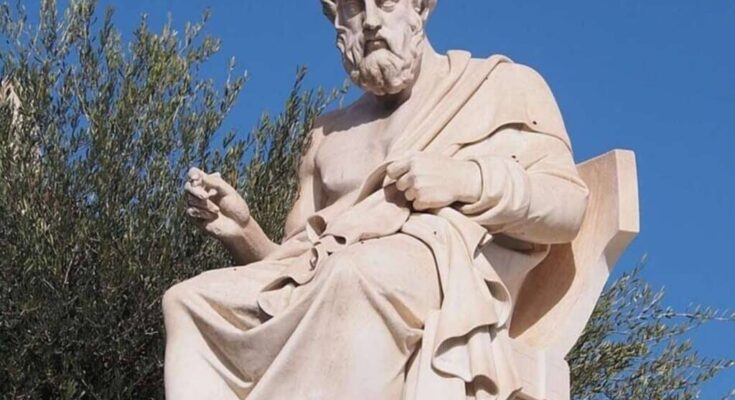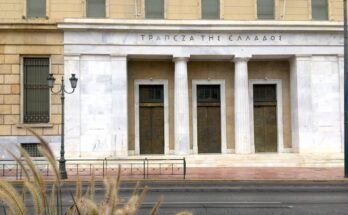
During his first journey to Sicily, Plato engaged in a philosophical dialogue with Dionysius the Elder, the tyrant of Syracuse. Although brief, this dialogue ultimately cost him his freedom, as Dionysius later sold Plato into slavery.
Plato’s decision to travel to Sicily
Plato believed that all political systems of his time were fundamentally flawed. Rejecting the common notion that justice was merely a social convention, he sought to establish a polity that would embody “justice itself” on earth.
As he himself writes in his 7th epistle:
“While at first I was filled with eagerness for political action, as I watched everything turn upside down, I was ultimately overcome with dizziness. Of course, I did not cease investigating how it might be possible to correct all that I mentioned, particularly the state in general.
However, I always awaited the right moment for action. Ultimately, I realized that none of our contemporary states is governed properly. Their legislation is, one might say, in a condition that we cannot heal without serious preparation and the aid of some extraordinary fortune.
Thus, I was compelled to extol true philosophy, asserting that through it, one can see justice everywhere—in the state as well as in individual lives. Consequently, generations of people will continue to suffer unless either those who truly and correctly philosophize take political power into their hands, or political leaders, by divine decree, truly philosophize.”
Plato condemns tyranny but also sees hope in it
Tyranny is an anathema in all of Plato’s works. Both in the Myth of Er and the “Gorgias,” Socrates narrates how, in the afterlife, tyrants are eternal punished in Tartarus. Plato viewed tyranny as the worst form of government and the tyrant as the most unfortunate of men.
However, he also saw tyranny—the worst form of government—as a potential precursor to the best form, namely a kingdom or an aristocracy. The key difference between a tyrant and a king is that the king or nobleman cares for the whole society and strives for the happiness of the city, while the tyrant seeks only his own material benefit. In Plato’s ideal aristocracy, kings, or the best men, would be philosophers who lead with reason, whereas tyrants rule through cruelty and violence.
At the same time, Plato believed that tyrants and philosopher-kings (or nobles) shared something in common. Both acted “beyond the mediocrity” of written laws and were, in a sense, laws unto themselves. Both held power above convention, but the crucial difference was that the tyrant acted outside the law to do evil, while the philosopher-king or noble acted for the greater good.
Following the Socratic idea that “no man is born evil, only ignorance makes him evil,” Plato believed he could transform a tyrant such as Dionysius into a philosopher-king. This is why he traveled to Sicily. He hoped that by convincing the tyrant, he could persuade him to establish an aristocracy.
Plato’s dialogue with Dionysius that caused him to be exiled and sold as a slave
However, Plato’s journey was unsuccessful. Not only did the citizens have entirely different habits, but the tyrant also could not tolerate his words. In The Life of Plato, written by Olympiodorus, we see a dialogue between Plato and the tyrant Dionysius. According to Olympiodorus, this cost Plato both his stay in Sicily and his freedom.
This dialogue is a great source of knowledge on the libertine spirit and defiance of despotism. That spirit was common among ancient Greek philosophers, but it also helps us look into how Plato viewed leadership:
“When he was in Syracuse with Dionysius the Elder, the tyrant, he endeavored to change the tyranny into an aristocracy. And it was for this purpose that he visited the tyrant. But Dionysius, asked him whom among men he considered happy. For he thought that the philosopher, seeking to flatter him, would say it was him. Plato answered: ‘Socrates.’
Again, the tyrant asked him, ‘What do you think is the business of a politician’? Plato replied, ‘To make the citizens better.’
Dionysius asked him a third time, ‘Then, does it not seem to you to be a small matter to judge rightly in judicial affairs’? For Dionysius was famous for his fair judgments in such matters. Plato boldly answered: ‘It is a small matter, and the least part of good conduct; for those who judge rightly resemble those who repair torn garments.’
Finally, Dionysius asked him, ‘Must not a tyrant be brave?’ Plato replied, ‘Of all men, he is the most timid. For he even fears the razors of his barbers, lest he be killed by them.’
With these answers, Dionysius became so indignant that he ordered Plato to leave at sunrise.”
Olympiodorus also adds this when Dionysius asked Plato if he considered him a good leader. He attempted to base this on the fact that he did not steal from state wealth. Plato replied that this was not nearly enough. He added that “if he had been stealing, he would not even make for a good slave.”
Lessons from the dialogue: Tyranny, wealth, and the pursuit of true leadership
The dialogue is proof of just how much Plato despised tyranny and viewed tyrants as unhappy. It also shows how he placed great responsibility on the best leaders of the city. His words sound surprisingly modern, as in our age. When general distrust toward leaders has risen in the Western world, people often ask for simple honesty and fewer scandals. However, for Plato, being just has more to do with what one does rather than what one refrains from doing. The absence of injustice does not necessarily imply the presence of justice.
We also see how much Plato despised extreme wealth and the supposed “happiness” of tyrannical life. He pointed out how insecure tyrants feel, constantly afraid that someone might assassinate them. Plato even considered Socrates happier than Dionysius or any tyrant. This is because Socrates did not view a free man as one who was extremely wealthy who could satisfy all his cravings. Instead, in line with Socratic principles, he saw the happy man as someone who limits his desires. He believed that this was the true path to happiness.



